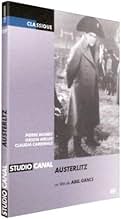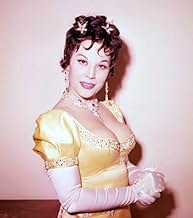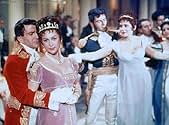VALUTAZIONE IMDb
6,2/10
1048
LA TUA VALUTAZIONE
Le avventure di Napoleone nella battaglia di Austerlitz, dove ottenne la più grande vittoria della sua carriera, sui russi.Le avventure di Napoleone nella battaglia di Austerlitz, dove ottenne la più grande vittoria della sua carriera, sui russi.Le avventure di Napoleone nella battaglia di Austerlitz, dove ottenne la più grande vittoria della sua carriera, sui russi.
- Regia
- Sceneggiatura
- Star
- Premi
- 1 candidatura in totale
Recensioni in evidenza
...and to "Napoleon" whose life Gance transferred to the screen in the silent era.Sandwiched between two very underrated Gance works ("la Tour de Nesles" and "Cyrano et D'Artagnan" )it is a return to "real " "true" history.I will go as far as to write that Gance impressed me much more when his movies dealt with fictionalized history (the two mentioned movies,but "j'accuse" too)."Austerlitz has something academic ,conventional.It has nothing of Gance's madness.The first part is a stream of stars from Martine Carol to Claudia Cardinale ,from Jean Marais to Orson Welles (in a part which reminds us how Gance was interested in the development of science through the centuries ,à la Jules Verne,we find this interest in "Cyrano" and "J'accuse" too).THe lead is a good actor but he might be ,on an international level, the least known of them all:Pierre Mondy's name is buried in the cast and credits and although he is on the screen from the beginning to the end,his name is not bigger than that of Welles who appears barely five minutes.Ah fame! The first part has only one sequence where we find back the inventive Gance:we do not attend the coronation in Notre Dame ;the marechal de Ségur (Jean-Louis Trintignant) tells the whole story with the model in front of a strange audience:servants ;then the "mamma " ("pourvu que ça dure!=lets hope it lasts!") ,Napoleon's mother (Elvire Popesco) enters and her tears begin to flow .Although David put her in his famous painting she did not attend the ceremony.
The second part is more historically interesting ,but if you are not fond of military strategy ,you may stop yourself yawning.Fortunately a soldier of the old guard of Napoléon (un "grognard" )played by Michel Simon brings a bit of life among these troop movements.
Last but not least:I have always asked myself why a convinced pacifist such as Gance (his two versions of "j'accuse" may be the strongest anti-war films ever)could be so fascinated by a warrior such as Napoleon.
The second part is more historically interesting ,but if you are not fond of military strategy ,you may stop yourself yawning.Fortunately a soldier of the old guard of Napoléon (un "grognard" )played by Michel Simon brings a bit of life among these troop movements.
Last but not least:I have always asked myself why a convinced pacifist such as Gance (his two versions of "j'accuse" may be the strongest anti-war films ever)could be so fascinated by a warrior such as Napoleon.
Austerlitz (1960) was the battle that made Napoleon Bonaparte not only one of western civilization's greatest generals, but it solidify his position as Napoleon I "The Emperor of France". I saw this film many years ago on video. The colors were washed out and it was cropped big time. Besides these faults, the movie was great. If there's a movie that needs to be restored it's this one. A film of this magnitude and the grand scale it was presented on needs to be shown it is original glory.
NAPOLEON was restored recently. It's only fitting that the film that the same director spent his entire life on have one of it's sequels be remastered and preserved in the same way.
Highly recommended.
NAPOLEON was restored recently. It's only fitting that the film that the same director spent his entire life on have one of it's sequels be remastered and preserved in the same way.
Highly recommended.
This movie exemplifies the debt that French cinema owes to theater. And, it shows how it can crumble under it.
One cannot say that this movie is badly made, lazy or uninspired. Yet, I did not feel the grandeur of this historic episode as I think it was intended. The movie is not boring or flat. However, for a film that covers the most brilliant victory of a legendary general, it feels a bit toothless.
The film spends the first half carefully laying out the situation and issues that led Napoleon to crown himself emperor. I would say that it is rather static, and feels like a play. It is dialog-heavy. I am not sure why Mondy was chosen as Napoleon. He looks convincing in most of it, yet he does a lot of yelling, which does not give off a statesman-like quality. It does not really capture the heft of it. The film is also heavy on intrigue and personal drama, it can feel tedious if you're not into French history. Some important events happen off-screen; it is harder to keep being engaged with what is happening.
My favorite scene happens as an act-break of sorts, roughly at the middle, it is Napoleons coronation. It is off-screen as well, but it is represented in form of house staff following the ceremony in parallel; at the palace not the church, with the help of rehearsal miniatures. That is where Gances talent shines. It is the best stuff in the movie and it is very clever and inventive. I suspect that it was done this way because filming the actual re-enactment of the ceremony would have been too expensive/difficult. Yet, it totally works. It treats an event that is big, extravagant, symbolic in something more intimate. The scene encapsulates something more classical. Because it focuses not on Napoleon, the pope or the dignitaries, but on the house staff reactions, you get something sweetly human. It is the reaction of the common folk, the little people. One of his aides provides a voice-over that turns the scene into something very poetic, almost Communion-like. It makes it very solemn and dignified. The immobile lifeless miniatures tie the scene in a very iconic, clean, divine bow.
Generally, you get that this film serves as an update to Gances own Napoleon. In that sense, it would serve as an example that less is more. The previous film was regarded, and still is, as one of the most inventive and important of the silent era. Here, you can feel that with the use of sound, dialog, color and the ability to film battles and impressive set-pieces; you are losing the essence of Napoleon: the persona. The strength of the film Napoleon was the visuals and the sense of distant majestic dignity it conveyed. In Austerlitz, despite sound and color, you lose the striking visual poetry. You are left with more precise plot points, but less evocative characters.
One cannot say that this movie is badly made, lazy or uninspired. Yet, I did not feel the grandeur of this historic episode as I think it was intended. The movie is not boring or flat. However, for a film that covers the most brilliant victory of a legendary general, it feels a bit toothless.
The film spends the first half carefully laying out the situation and issues that led Napoleon to crown himself emperor. I would say that it is rather static, and feels like a play. It is dialog-heavy. I am not sure why Mondy was chosen as Napoleon. He looks convincing in most of it, yet he does a lot of yelling, which does not give off a statesman-like quality. It does not really capture the heft of it. The film is also heavy on intrigue and personal drama, it can feel tedious if you're not into French history. Some important events happen off-screen; it is harder to keep being engaged with what is happening.
My favorite scene happens as an act-break of sorts, roughly at the middle, it is Napoleons coronation. It is off-screen as well, but it is represented in form of house staff following the ceremony in parallel; at the palace not the church, with the help of rehearsal miniatures. That is where Gances talent shines. It is the best stuff in the movie and it is very clever and inventive. I suspect that it was done this way because filming the actual re-enactment of the ceremony would have been too expensive/difficult. Yet, it totally works. It treats an event that is big, extravagant, symbolic in something more intimate. The scene encapsulates something more classical. Because it focuses not on Napoleon, the pope or the dignitaries, but on the house staff reactions, you get something sweetly human. It is the reaction of the common folk, the little people. One of his aides provides a voice-over that turns the scene into something very poetic, almost Communion-like. It makes it very solemn and dignified. The immobile lifeless miniatures tie the scene in a very iconic, clean, divine bow.
Generally, you get that this film serves as an update to Gances own Napoleon. In that sense, it would serve as an example that less is more. The previous film was regarded, and still is, as one of the most inventive and important of the silent era. Here, you can feel that with the use of sound, dialog, color and the ability to film battles and impressive set-pieces; you are losing the essence of Napoleon: the persona. The strength of the film Napoleon was the visuals and the sense of distant majestic dignity it conveyed. In Austerlitz, despite sound and color, you lose the striking visual poetry. You are left with more precise plot points, but less evocative characters.
My review of this film can be summed up in five words a brilliant work of art.As described in the previous description the film itself is long and sometimes tedious.What it fails to mention is that it was created by the same Director that brought us the Silent film about Napoleon Abel Gance.The film is in colour and is very faithful to the feel of Napoleon and the time he ruled Europe.It is primarily about the greatest victory Napoleon achieved in his career,however it also touches on many of the events in his life leading up to that moment including his coronation as Emperor of France.If you are a student of Napoleon or French history or this time period you will enjoy this picture.Shot all throughout Europe in the fifties in many languages it remains in my opinion as the greatest picture chronicling Napoleon and his life.The film not only tells a story from his perspective but many others as well.It is difficult to find and even more expensive to own but I definitely recommend you see it at least once for yourself.
Abel Gance's unabashed adoration of Napoléon Bonaparte bore fruit in one of the undisputed masterpieces of silent cinema. Thirty-four years later he again depicts his hero in a film that is totally devoid of the flair and dazzling inventiveness of the earlier work. He is assisted by Roger Richebé who had directed Gance's original Napoléon, Albert Dieudonné, in that actor's second outing in the role in 'Madame sans-gene.' Here he is played by Pierre Mondy.
One is impressed by the art direction, costume design and the beautifully shot series of tableaux vivants by Messieurs Alekan and Juillard but alas the whole enterprise is verbose, bombastic, self-indulgent and uninspired and fails to justify its lumbering two and three-quarter hour length.
Most of the males are marionettes with the notable exceptions of Welles, Marais, Trintignant and Marchal whilst grizzled Michel Simon does an outrageous turn as one of Napoléon's Old Guard. Plenty of cleavage on display and an enchanting cameo by Leslie Caron as one of Bony's extra-marital activities. The most ludicrous piece of casting is that of Jack Palance as an Austrian General. As Pope Pius V11 an utterly expressionless Vittorio de Sica calls Bonaparte ' a comedian' which pretty well sums up Pierre Mondy's portrayal.
Regarding Monsieur Gance's output I think it fair to say that 'silence is golden.'
One is impressed by the art direction, costume design and the beautifully shot series of tableaux vivants by Messieurs Alekan and Juillard but alas the whole enterprise is verbose, bombastic, self-indulgent and uninspired and fails to justify its lumbering two and three-quarter hour length.
Most of the males are marionettes with the notable exceptions of Welles, Marais, Trintignant and Marchal whilst grizzled Michel Simon does an outrageous turn as one of Napoléon's Old Guard. Plenty of cleavage on display and an enchanting cameo by Leslie Caron as one of Bony's extra-marital activities. The most ludicrous piece of casting is that of Jack Palance as an Austrian General. As Pope Pius V11 an utterly expressionless Vittorio de Sica calls Bonaparte ' a comedian' which pretty well sums up Pierre Mondy's portrayal.
Regarding Monsieur Gance's output I think it fair to say that 'silence is golden.'
Lo sapevi?
- QuizIn the 1920s Abel Gance had written a six-part movie biography of Napoleon. He shot the first part (Napoleone (1927)), which turned out to be a financial disaster. He sold the sixth part to Lupu Pick, who shot Sant'Elena (1929). Wanting to make a comeback at the end of the 1950s, Gance rewrote the third part to make it "Austerlitz".
- BlooperIn the scene in William Pitt's office in London which is set in the early 1800's, you can see in the background through the window the Houses of Parliament and Big Ben, 60 years before they were built.
- Versioni alternativeThe original French version runs longer than the English dubbed international one. It contains extra scenes including ones with Napoleon visiting his mistress and of Ségur (Jean-Louis Trintignant) imagining the coronation of the emperor for the palace staff.
- ConnessioniEdited into Histoire(s) du cinéma: Seul le cinéma (1994)
I più visti
Accedi per valutare e creare un elenco di titoli salvati per ottenere consigli personalizzati
- How long is The Battle of Austerlitz?Powered by Alexa
Dettagli
- Data di uscita
- Paesi di origine
- Lingua
- Celebre anche come
- The Battle of Austerlitz
- Luoghi delle riprese
- Aziende produttrici
- Vedi altri crediti dell’azienda su IMDbPro
Botteghino
- Budget
- 4.000.000 USD (previsto)
- Tempo di esecuzione2 ore 46 minuti
- Mix di suoni
- Proporzioni
- 2.35 : 1
Contribuisci a questa pagina
Suggerisci una modifica o aggiungi i contenuti mancanti

Divario superiore
What is the English language plot outline for Napoleone ad Austerlitz (1960)?
Rispondi

























